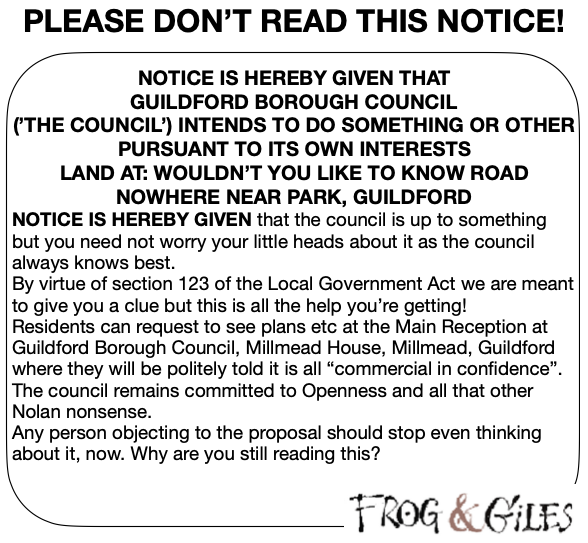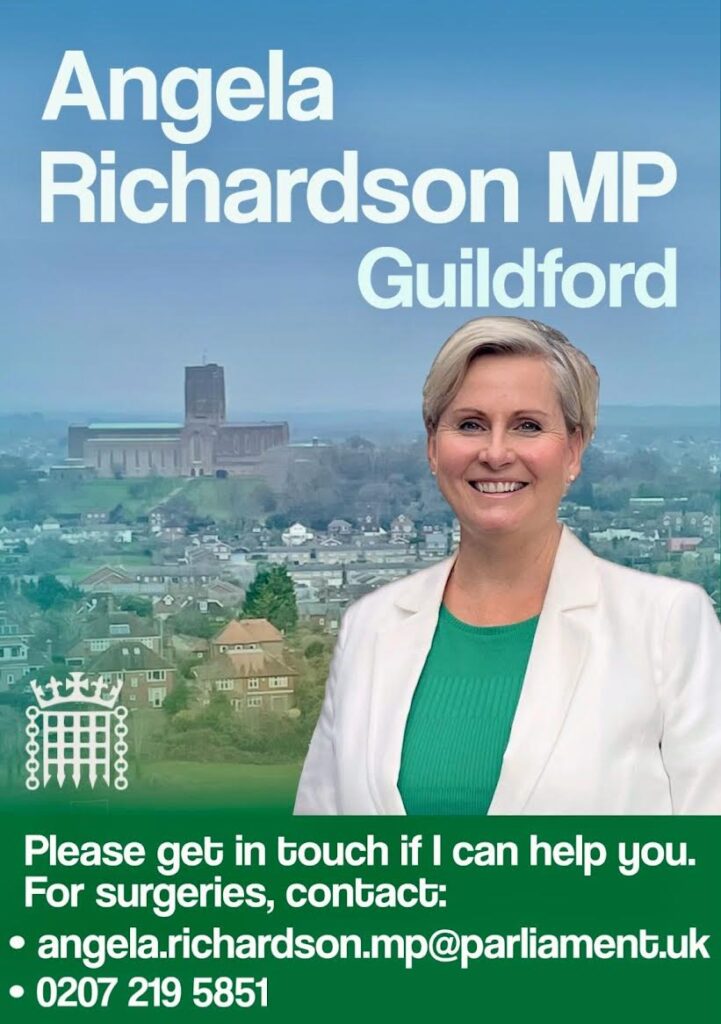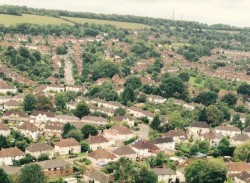 Abraham Lincoln
If given the truth, the people can be depended upon to meet any national crisis...
Abraham Lincoln
If given the truth, the people can be depended upon to meet any national crisis...
 Guildford news...
for Guildford people, brought to you by Guildford reporters - Guildford's own news service
Guildford news...
for Guildford people, brought to you by Guildford reporters - Guildford's own news service
Letter: We Should Be Supporting the Council and Its Local Plan
Published on: 5 Sep, 2016
Updated on: 5 Sep, 2016
In response to comments made about his first letter: What Gives Us The Right To Say No To Growth?
I make no secret of my background as an urbanist, and indeed why should my opinion count any less as a consequence? Frequent Guildford contributor Bibhas Neogi has a background as an engineer and makes frequent comment on the state of traffic in the town.
Why should the views of a longstanding resident with a background in landscape and new settlement design with experience of growth and development up and down the country not be able to make valid comment?
It is certainly not only people with property business interests who are pro-growth, but it does seem to be the case that persons with opposing views are quick to seek to silence what they see as an unjustified position?
Few, if any persons writing in to this publication seem willing to enter into a mature debate about the history and purpose of green belt. Firstly there is nothing in UK planning law that suggests that green belt was to be a designation in perpetuity. Local Plans are precisely the vehicles for reviewing green belt.
The original 1947 Town and Country Planning Act initiated green belts as an exchange for protection of countryside as a consequence of the new towns, needed for Britain’s post-war growth and reconstruction, but this sense of exchanging growth for protection has seemingly been forgotten in favour of protection only.
The legislation was not created as asserted because ‘one day developers would want to build everywhere’, but rather as part of a negotiation over long fulfilled growth.
Now that we’ve had that growth we need to look at the boundaries of our towns and cities once more.
Furthermore, the precursor to green belts, the ‘agricultural belts’, referenced in Sir Ebenezer Howard’s seminal work – ‘Garden Cities of To-morrow’, envisaged the belts surrounding areas of growth as far more of a productive and engaging landscape and certainly not the absolute “set-in-aspic” protectionism associated with today’s green belts.
I think the final point I’d like to make concerns the notion of sprawl. By its nature this is something unplanned, unchecked and not comprehensively thought out. All of the development areas surrounding the town have been subject to thorough checks, assessments and masterplans.
Whilst I’ve not personally been involved with any projects in the borough (although I did used to work for a practice that has been), I note that each is following sound practice and will, in time, become as much an extension of the town as say Onslow Village or areas of Merrow.
The draft Local Plan does take constraints into account. The key point, well understood by councils who’ve gone ahead and delivered the much needed new housing, that only with growth will we secure the funding and investment needed to deliver the infrastructure to improve the wider sustainability of our town.
Dame Kate Barker’s point is that we are headed for trouble, but that many people don’t realise (or want to admit to) it yet. Sooner or later we’ll all be in a fix.
At least this Local Plan and the officers and members who have supported it can see that and rather than decrying their efforts, we ought to be supporting them.
Responses to Letter: We Should Be Supporting the Council and Its Local Plan
Leave a Comment Cancel replyPlease see our comments policy. All comments are moderated and may take time to appear.

See Dragon story: GBC’s Explanation of Major Land Sale Notice Error ‘Borders on Arrogant’ Says Councillor







Recent Articles
- City and Manager ‘Part Company’ After Slide in Results
- PCC Election Result – Conservative Lisa Townsend Retains Commissioner Role
- Letter: It’s a Sad State of Affairs
- Times Rankings Showing GBC To Be Worst Council in Surrey Dismissed by Lib Dems
- Birdwatcher’s Diary No.303
- Letter: What a Scoop!
- Filmfest – a Festival of German Films
- Letter: Help Abroad Should Not Be to the Detriment of Those Here
- Armed Police Deployed After Fight at Ash Vale Pub – Four Arrested
- Surrey Schools Could Have ‘Meat-free Mondays’ If Strategy Adopted


Recent Comments
- Frank Emery on Latest Figures Show Two in Every Three Burglaries Went Unattended in Surrey
- Sara Tokunaga on Surrey Schools Could Have ‘Meat-free Mondays’ If Strategy Adopted
- John Lomas on Letter: Jeremy Hunt Has Not Engaged With Ash Parish Council As Claimed
- Jane Austin on Letter: Jeremy Hunt Has Not Engaged With Ash Parish Council As Claimed
- David Humphries on Letter: It’s a Sad State of Affairs
- David Roberts on Letter: Help Abroad Should Not Be to the Detriment of Those Here
Search in Site
Media Gallery
Dragon Interview: Local Artist Leaves Her Mark At One of England’s Most Historic Buildings
January 21, 2023 / No Comment / Read MoreDragon Interview: Lib Dem Planning Chair: ‘Current Policy Doesn’t Work for Local People’
January 19, 2023 / No Comment / Read MoreA3 Tunnel in Guildford ‘Necessary’ for New Homes, Says Guildford’s MP
January 10, 2023 / No Comment / Read More‘Madness’ for London Road Scheme to Go Ahead Against ‘Huge Opposition’, Says SCC Leader
January 6, 2023 / No Comment / Read MoreCouncillor’s Son Starts Campaign for More Consultation on North Street Plan
December 30, 2022 / No Comment / Read MoreCounty Council Climbs Down Over London Road Works – Further ‘Engagement’ Period Announced
December 14, 2022 / No Comment / Read MoreDragon Interview: GBC Reaction to the Government’s Expected Decision to Relax Housing Targets
December 7, 2022 / No Comment / Read MoreHow Can Our Town Centre Businesses Recover? Watch the Shop Front Debate
May 18, 2020 / No Comment / Read More







Jules Cranwell
September 5, 2016 at 1:56 pm
Growth is not inevitable. It is necessary only as long as the population continues to rise.
However, on the basis that you cannot fit a quart into pint pot, Guildford can sustain only a little growth, not the massive growth GBC is committed to.
There are many areas in the UK that are crying out for growth, and are indeed stagnating, as population constantly shifts to the South East.
Significant growth in Guildford’s town and villages is unsustainable, as the infrastructure is at full stretch, and at breaking point.
The GBC Executive’s absurd commitment to massive housing estates, with no sensible plan for fixing, let alone improving the infrastructure, will destroy the borough.
George Richardson
September 5, 2016 at 7:20 pm
If I lived in a spacious house with a garden in our idyllic, green belt designated area it would be a situation that would be treasured and appreciated.
If I lived in a small, multi-storey bed sit in a northern conurbation I may look at our privileged situation in the Guildford conurbation with envy.
Maybe, as a Surrey resident, I could rationalise that I have worked hard for what I have and the status quo is correct or maybe I can reluctantly agree that while my current situation is precious, it would be fairer to consider how a coherent, planned expansion to accommodate and share our beautiful amenities is both fair and responsible.
Parts of the green belt may be sacrificed but it would be for the greater benefit of others.
Paul Bishop
September 6, 2016 at 10:03 am
It is great to read a letter with such sense and perspective!
I think Mr. Gross’s letters are backed up by a very large number of residents in the town, certainly many more than you would expect based on the opinions of these pages.
Jim Allen
September 6, 2016 at 2:36 pm
Of course we should be supporting our Local Plan if it represented the wishes of the residents of our borough, our communities and the infrastructure is in place to prevent our homes becoming uninhabitable due to lack of water, drainage, electricity and air pollution. What is planned should not exacerbate current problems.
The Local Plan’s main aim should be solving current problems rather than creating more of the same previously ignored problems caused by political dogma and half baked impractical ideas of the past.
We are not objecting for the sake of objecting but because we have serious reservations as to the Local Plan. We do not regard it as a thoroughly thought out, rounded, rational and common sense solution to the futures problems of living and surviving in our borough or on our planet.
In the 1940’s Clough Williams Ellis said candidly: “No one else can quite do this sort of thinking for you, because no-one else knows just how you live, or would like to live, or to say what it is you, the customer, requires, because if you do not do this loudly and insistently then, it will scarcely be the planners, fault if they dish up something you don’t want at all.”
Well the people have spoken and said “No” to what the planners propose.